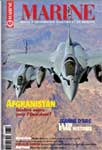
In the current issue of Marine, a quarterly publication by the French Navy’s Association of Reserve Officers (Association des officiers de réserve de la Marine nationale) a special series of articles on NATO’s involvement in Afghanistan called «Afghanistan: Which Path for the West?» is being featured.
Beyond the political debate about whether or not Western involvement in general and French increased commitment in particular are legitimate or not, Marine is running an interview conducted by Bertrand de Lesquen with Commander Bruno de Zélicourt on the role and future of Special Forces in Afghanistan. Commander de Zélicourt (Capitaine de Vaisseau) of the French Navy Commandos, was in command between April and August 2006 of the eighth detachment of French Special Forces (FSF) in Afghanistan.
Air Mobility and Intelligence-Sharing Keys to Special Forces Operations
Task Group Ares operated in Afghanistan from July 2003 to December 2006 and was composed of the French Commandos Marine , the 1st RPIMa, the 13th RDP and CPA 10. At first, the FSF were operating in the Kandahar region, in the districts of Manif and Arghestan. Then, they were reassigned to the East of the country in the province of Nangarhar. Some facets of the missions included the training of the nascent Afghan Army.
Commander Bruno de Zélicourt describes the types of operations the FSF ran in Afghanistan according three axes:
- “ the search for intelligence”;
- “foot and motorized patrols in order (…) to assert our presence and reassure the population”;
- And finally, “operations meant to intercept Taliban elements” thanks to intelligence tips received by allies.
Commander de Zélicourt points out that “air mobility” is a crucial element in the conduct of an operation. He regrets that the major operations launched by the International Security Assistance Force (ISAF) in the South of the country in 2006 and the simultaneous effort brought by the Americans in Iraq at this time have decreased the presence of helicopters and hence the opportunities of operations. “This type of deficiency is still present to this day in Special Forces operations”, he says.
On the strategy side, he tends to support General Bigeard’s view that the war in Afghanistan is of the ‘same type’ than the war in Algeria in the sense that “one of the key for victory resides in the capacity to deliver intelligence, to uncover the networks, to identify and eliminate the leaders, to break the structures”. This type of strategy, he points out, requires a great deal of intelligence sharing among the different armies and he expresses regrets that these types of exchanges are only limited to the so-called ‘four eyes’ community: the US, the UK, Canada and Australia. He notes however, that the US is trying to expand that circle, which constitutes “a step in the right direction”.
The End of FSF Presence in Afghanistan: the Risk of Being Singled Out and OBE
Bruno De Zélicourt also comments on the end of the FSF presence in Afghanistan, in spite of the fact that France is among the few five nations within NATO qualified to command on a multinational basis several Special Forces units. Except for the continuing training of Afghan Special Forces, the FSF have stopped operating in Afghan territory since 2006. This absence, warns the Commando Marine officer, could single France out in the eyes of NATO allies and could in the longer run “lead to losses of know-how and competencies that could jeopardize the future”.
After leaving the command of the FSF in Afghanistan, Bruno de Zélicourt was posted in NATO Special Operation Forces Headquarter (NSHQ) from September 2007 to July 2009. He explains that this branch was given the mandate to be “the vector for Special Forces transformation in order to make them interoperable and able to participate in NATO’s operations.” Because of the nature of this post and its frequent interactions with other NATO’s Special Forces officers, he concludes that what counts for allies and especially the US are the “boots on the ground”. In that sense, France’s presence in Afghanistan during the Ares mission (2003-2006) has given Paris some credit in the eyes of others. However, he warns that this credit is starting to evaporate because of the FSF withdrawal from the theater under a NATO banner. France is running the risk of being “distanced on the technological side as well as in terms of skills and process,” Zelicourt adds. Norway, he says, is in the eyes of many an example to follow in the realm of Special Forces.
In conclusion, he advocates for France to take more responsibility in the future NSHQ, in order to have a greater say – and hence influence – in the way the Atlantic Alliance conducts its Special Forces operations. He calls for France to resume its Special Forces operations alongside its allies in Afghanistan and to be a leading nation in this field. “We have strong assets especially in the training domain,” Commander Zelicourt stresses.
———-
***Posted November 30th, 2009

